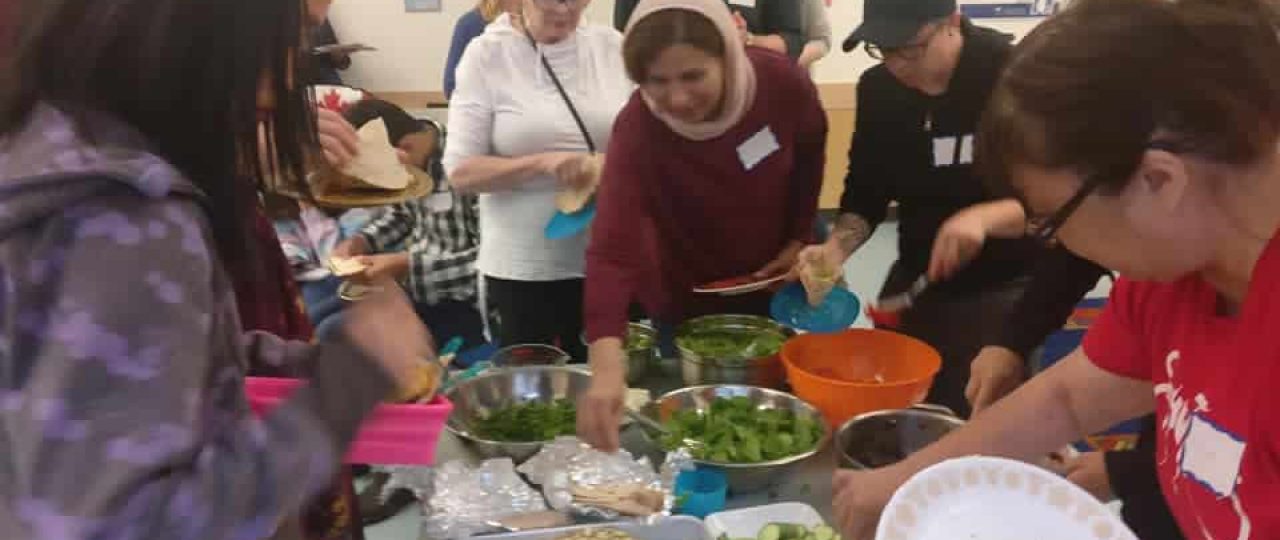After the birth of my first son in 2018, I became even more concerned about the state of the world and started planning how to reduce our family’s environmental impact.
When I told my therapist how bad I felt about eating meat and how hard it was to stop, she told me she was a vegan herself and would be happy to help me. From then on, after each session, she sent me home with lots of plant-based foods that she’d cooked, and everything tasted wonderful.
I loved eating her food, but I needed to learn to cook. So we came up with the idea of starting a group where she could teach people like me who wanted to eat a more plant-based diet but didn’t know where to start.
The steps we followed to start our grassroots group
1. Define the scope of the project
We didn’t just want to talk about food, we wanted to make new friends and build community in our city. Therefore, the group should be local so people could learn to cook and meet their neighbours. We’d need a large, accessible kitchen and the classes should be free so anyone could attend.
Once all of these requirements were met, we would need to get the word out about the group so people could join and we could hold our first event.
2. Get the support you need to get the group off the ground
Once the project was ready, we set out to find supporters to make the idea a reality. I found out that the Vancouver Foundation offers Neighbourhood Small Grants to residents who have plans to engage people in their neighbourhood. I applied and the CAD $500 we received made the free classes possible.
A local elementary school provided us with their kitchen and a comfortable room for the classes. Many staff members were excited about the idea and wanted to help out, so we had volunteers from the beginning.
3. Advertise your initiative and get people to join in
Our city was relatively small and had many active local Facebook groups, which were perfect for getting the word out about the classes.
We created the New Westminster Plant-Based Cooking Club and promoted the first class to five of these groups. Within two hours, more than 80 people had signed up and there was a waiting list
4. Analyse the results and keep improving
Twenty-five people attended our first class in 2019. It was a success: everyone cooked, ate and had a great time. We were excited, but also realised that a few things could’ve gone differently. For example, some people signed up but didn’t show up, so there were too many leftovers – we could’ve saved money on food for the next class.
After each class, we organisers sat down to talk about what worked well and what we could improve for the next event. We discussed how best to engage members and set rules for all of us to follow – one of them, for example, was that no pictures of dead animals were allowed in the group to promote veganism, as we wanted to educate and help people make good choices, not shame them into becoming vegans.

The group today
There were four more classes after that first one. The group grew and people shared recipes, became friends, and organised their own meetings – we’d achieved our goal of building a community!
When my son became a toddler and my maternity leave ended, I was too busy and could no longer be an organiser. Then the pandemic hit and classes were moved online.
I had another son in 2020 and moved from the west coast to the east coast of Canada a few months ago, so I’m no longer in the group. I miss the delicious food and the friends I made there, but I’m already planning something in my new city.
Starting a grassroots group is easier than you think

I know it sounds hard at first, but if you make a plan and look for help, you’ll be amazed at how much support and interest you’ll get. Search for small grants locally, ask local retailers for sponsorship, and support from organisations like schools, churches, and community centres in your area.
One person always knows someone who knows someone who can help, and so the thread continues and things get rolling. The world needs good communities now more than ever and people are looking for meaningful connections – someone just needs to get the ball rolling.




